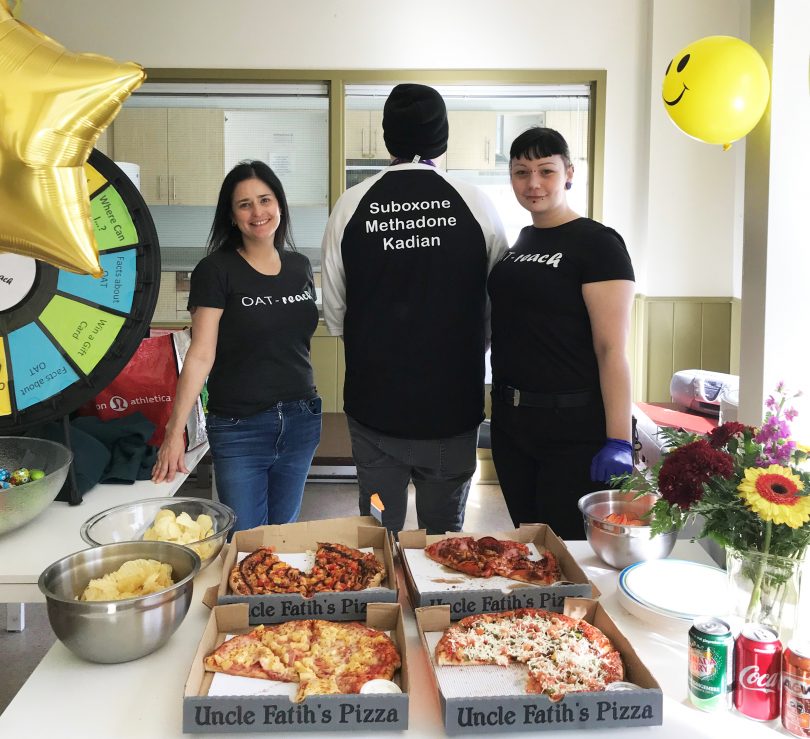The waiting room of Foundry’s Granville Street location is awash with cheerful, bright colours. It’s a welcome atmosphere, but just below the surface there is anguish.
“We’ve lost so many clients,” says Keren Mitchell, nurse practitioner. “We build close relationships with the youth in our programs, we get to know them very well, and it’s been a really difficult time for the staff here.”
In Vancouver alone, there were 382 deaths from opioids in 2018. It’s not just lives that are lost; many of those who survive their overdoses are left with significant, life-limiting brain injuries.
“We don’t have time to waste, there’s a great urgency to intervene”, says Keren.
For the team at Foundry, this crisis has highlighted the need to step out of the box and do things differently.
In February 2018, the team introduced Microdose Mondays, which uses a microdose protocol to initiate regular dosing of Suboxone in youth with significant barriers to induction, such as homelessness, psychosis, or developmental disabilities. Conventional Suboxone induction requires clients to be supervised in a clinic setting and to be in moderate withdrawal when they begin the medication. This is because Buprenorphine, the active ingredient in Suboxone, will rapidly displace other opioids from the receptors, resulting in the person experiencing intense withdrawal symptoms that are difficult to reverse. This is a barrier for youth who cannot tolerate withdrawal, or have trouble consistently attending clinic visits.
Microdose induction involves introducing a very low dose of Suboxone and gradually increasing it over 5-7 days, thereby allowing the brain to adjust without precipitating withdrawal. Microdose induction allows the team to start youth on Suboxone on the spot, without the need for withdrawal. As the Microdose Monday project progressed, the team added other forms of Opiate Agonist Therapy (OAT) and additional interventions to support youth with adherence. OAT prevents overdose and is the first-line treatment for opioid use disorder.
In February of this year, the team launched a program called OATreach for Foundry clients who are living at the St. Helen’s Hotel who have an opioid use disorder. St. Helen’s, operated by COAST Mental Health, offers low-barrier housing to youth, many of whom are right off the street.
Because it can be difficult for this cohort to access care, the Foundry team employs a variety of hands-on outreach methods such as reverse trick-or-treating (knocking on doors and offering candy and an opportunity to chat), to initiate relationships and build trust. The goal for the project is have 95% of the youth with opioid use disorder at St. Helen’s to be on a form of Opiate Agonist Therapy (Suboxone, Methadone, Kadian) by November 2019.
A secondary benefit of this kind of outreach is that the team is also able to provide support and treatment for health conditions, physical or mental, once the relationship has been established.
The Foundry team has also started an on-site drug testing program, where youth can bring their drugs to Foundry-Granville Monday – Friday, 9am-5pm to have their drugs checked for the presence of Fentanyl.
“Youth are very vulnerable, but they’re also incredibly resilient,” says Keren. “OAT helps to stabilize brain chemistry, which allows them to begin to stabilize their lives. They can take a break from constantly needing to use, and they can consider other options. Recovery looks different for everyone, but OAT can provide these young adults with a chance to connect with psychiatric and primary care, social services, as well as their family and friends.”
Foundry, formerly the Inner City Youth program, has from its inception in 2007 been transforming the way that mental health and substance use issues are treated among youth.
By providing a one-stop-shop for young people to access mental health care, substance use services, primary care, social services and youth and family peer supports, Foundry has established a province-wide network of integrated health and social service centres for young people ages 12-24. Learn more about Foundry’s work here.





